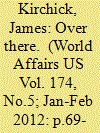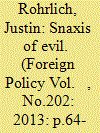|
|
|
Sort Order |
|
|
|
Items / Page
|
|
|
|
|
|
|
| Srl | Item |
| 1 |
ID:
115060


|
|
|
|
|
| Publication |
2012.
|
| Summary/Abstract |
PRAGUE - Viewing the Occupy Wall Street movement from post-Communist Europe, I can't stop thinking of October 1917.
This date, when the Bolsheviks seized power from the Russian Provisional Government and set in place a Communist dictatorship that would last for more than seven decades, was brought to mind by the recent comments of the great Polish dissident and newspaper editor Adam Michnik. Speaking on a panel at Forum 2000, the annual conference put on here by his friend, the former Czech president Vaclav Havel, Michnik heard a familiar message in the rhetoric of the protesters in New York. The topic at hand was "Europe's Future: Constitutional or Populist Democracy?" Fortunately, revolution (whether from the left or the right) is unthinkable in the United States, the world's oldest constitutional democracy. But it is not so unthinkable in Europe, destroyed by a world war just seventy years ago, where Spain and Portugal only emerged from fascist rule in the 1970s, and where one half of the continent freed itself from Communist domination not long after that.
|
|
|
|
|
|
|
|
|
|
|
|
|
|
|
|
| 2 |
ID:
130273


|
|
|
|
|
| Publication |
2013.
|
| Summary/Abstract |
The Prague Agenda outlined by the U.S. President Barack Obama four years ago appears marginal at best to the emerging nonproliferation challenges. This is especially true in the world's most important strategic theaters-East Asia and the Middle East. Obama's speech was indeed an inflection point in the U.S. foreign policy debate on nuclear disarmament and nonproliferation.
At its heart, the debate is about the nature and relevance of the arms control framework that emerged in the late 1960s and reached its apogee in the 1970s. This framework mainly aimed at stabilizing the nuclear relationship between the two superpowers-the United States and the Soviet Union-by laying down mutually acceptable rules of nuclear deterrence and regulating their competition. It also had a regional focus in managing the atomic dynamic in post-War Europe by getting most advanced European nations, especially the divided Germany, to renounce the nuclear weapon option. In Asia, the main regional focus was convincing Japan to accept a non-nuclear weapons status.
|
|
|
|
|
|
|
|
|
|
|
|
|
|
|
|
| 3 |
ID:
124707


|
|
|
|
|
| Publication |
2013.
|
| Summary/Abstract |
From Pepsi in Prague to Hershey bars in Hong Kong, American snack-makers enjoy a de facto oligopoly on global junk-food consumption. But what do snackers in U.S.-sanctioned countries eat when they get peckish? To find out, I embarked on a global scavenger hunt of sorts, collecting candy, chips, and soda that you won't find in American stores -- sometimes straight from the source (a recent reporting trip to Cuba) and sometimes by way of friends, acquaintances, and strangers around the globe. I enlisted New York Times food writer and bestselling author Mark Bittman to sample my collection of "enemy" snacks, which ranged from the mildly exotic to the blatantly imitative. Here are Bittman's tasting notes -- and a few words of warning.
|
|
|
|
|
|
|
|
|
|
|
|
|
|
|
|
| 4 |
ID:
130276


|
|
|
|
|
| Publication |
2013.
|
| Summary/Abstract |
Almost four years have passed since President Obama made his speech in Prague, outlining an agenda of nuclear disarmament, nonproliferation, and counterterrorism that envisioned "the peace and security of a world without nuclear weapons." His speech pledged a number of actions including: reducing the United States' (and others') reliance on nuclear weapons for national security, although he made clear that the United States would maintain "a safe, secure, and effective arsenal to deter any adversary and guarantee that defense to our allies;" negotiating a new Strategic Arms Reduction Treaty (START) with Russia, leading to further cuts with all nuclear states; seeking U.S. ratification of the Comprehensive Test Ban Treaty (CTBT); introducing a new treaty to end the production of fissile materials intended for use in nuclear weapons (now the proposed Fissile Material Cut-off Treaty, or FMCT); strengthening the Nuclear Non-proliferation Treaty (NPT) as a basis for cooperation; and expanding partnerships to lock down sensitive materials, break up black markets, detect and intercept materials in transit, and otherwise disrupt the illicit nuclear trade. "Because this threat will be lasting," Obama said, "we should come together to turn efforts such as the Proliferation Security Initiative and the Global Initiative to Combat Nuclear Terrorism into durable international institutions?…" He also announced "a new international effort to secure all vulnerable nuclear material around the world in four years.
|
|
|
|
|
|
|
|
|
|
|
|
|
|
|
|
|
|
|
|
|